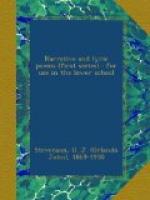Calling on each by his name, to order forward the ensigns;
Then to widen the ranks, and give more room for their weapons;
So he won the day, the battle of something-or-other.
That’s what I always say; if you wish a thing to be well done,
You must do it yourself, you must not leave it to others!” 115
All was silent again; the Captain continued
his reading.
Nothing was heard in the room but the
hurrying pen of the stripling
Writing epistles important to go next
day by the Mayflower,
Filled with the name and the fame of the
Puritan maiden Priscilla;
Every sentence began or closed with the
name of Priscilla, 120
Till the treacherous pen, to which he
confided the secret,
Strove to betray it by singing and shouting
the name of Priscilla!
Finally closing his book, with a bang
of the ponderous cover,
Sudden and loud as the sound of a soldier
grounding his musket,
Thus to the young man spake Miles Standish
the Captain of Plymouth: 125
“When you have finished your work,
I have something important
to tell you.
Be not however in haste; I can wait, I
shall not be impatient!”
Straightway Alden replied, as he folded
the last of his letters,
Pushing his papers aside, and giving respectful
attention:
“Speak: for whenever you speak,
I am always ready to listen. 130
Always ready to hear whatever pertains
to Miles Standish.”
Thereupon answered the Captain, embarrassed,
and culling his phrases;
“’T is not good for a man
to be alone, say the Scriptures.[20]
This I have said before, and again and
again I repeat it;
Every hour in the day, I think it, and
feel it, and say it. 135
Since Rose Standish died, my life has
been weary and dreary,
Sick at heart have I been, beyond the
healing of friendship.
Oft in my lonely hours have I thought
of the maiden Priscilla.
She is alone in the world; her father
and mother and brother
Died in the winter together; I saw her
going and coming, 140
Now to the grave of the dead, and now
to the bed of the dying.
Patient, courageous, and strong, and said
to myself, that if ever
There were angels on earth, as there are
angels in heaven,
Two have I seen and known, and the angel
whose name is Priscilla
Holds in my desolate life the place which
the other abandoned. 145
Long have I cherished the thought, but
never have dared to reveal it,
Being a coward in this, though valiant
enough for the most part.
Go to the damsel Priscilla, the loveliest
maiden of Plymouth,
Say that a blunt old Captain, a man not
of words but of actions,
Offers his hand and his heart, the hand
and heart of a soldier. 150
Not in these words, you know, but this
in short is my meaning;
I am a maker of war, and not a maker of
phrases,
You, who are bred as a scholar, can say
it in elegant language,
Such as you read in your books of the
pleadings and wooings of lovers,
Such as you think best adapted to win
the heart of a maiden.” 155




